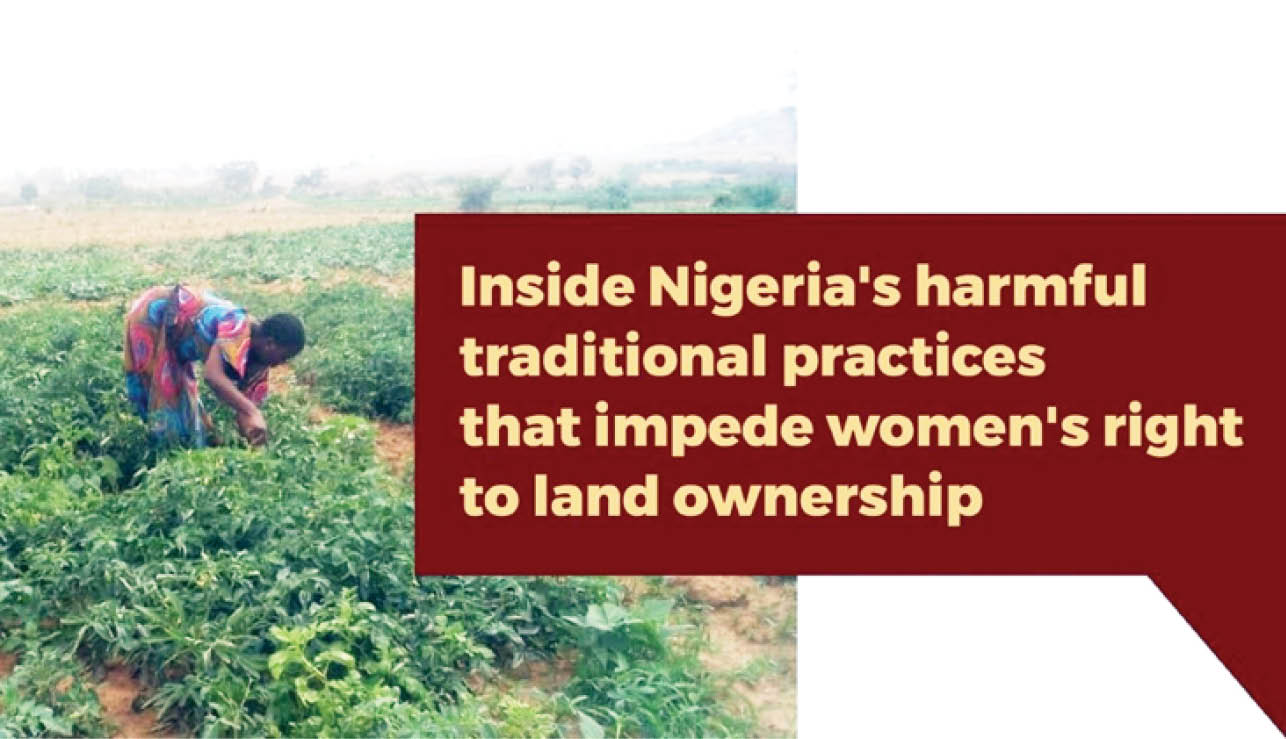A 1998 draft resolution of the UN Economic and Social Council Commission on the Status of Women states that land rights discrimination violates human rights. However, in some Nigerian communities, women are denied land ownership, a practice that hampers their economic empowerment. Daily Trust on Sunday looks at how this tradition, in some cultures, impedes women’s right to land ownership and the struggle to subvert such practice.
Elizabeth Dadi, a rice farmer from Plateau State, North-central Nigeria, lost her husband eight years ago. The mother of six girls, of the Aten ethnic group in Ganawuri, Riyom Local Government Area of the state, said her husband’s relatives took over his farmland. She and her children were left to fend for themselves.
Mammoth crowd as Muslims hold peaceful Sallah nationwide
Buhari will restore peace to Nigeria before leaving office – Malami
“Our people do not transfer land to women,” she said, referring to an Aten traditional custom where widows are dispossessed of land when their husbands die. “If a woman wants to own land, she has to raise the money and buy the land. In my culture, women do not inherit from their fathers; only men do. And even if the men are ‘gracious’ enough to part with a portion of their inheritance, it would not be land. The men share the land among themselves,” she added.
Land acquisition for men and women is, for the most part, through inheritance which to a great extent is influenced by the prevailing customs and norms in different parts of the country. Most often, men have a greater chance of inheriting land over women, a patrilineal system of land inheritance that persists despite the provisions of the law.
According to the United Nations Food and Agriculture Organisation (FAO), women comprise more than 51 per cent of the world’s population. However, they own less than 20 per cent of the agricultural land, according to the United Nations Food and Agriculture Organisation (FAO).
All across the globe, women’s access to land is limited, yet they are responsible for producing between 60 to 80 per cent of the food in most developing countries.
In Nigeria, women farmers face multiple challenges, including unfavourable cultural practices, unequal access to land, farming inputs, and support services.
Mary Abok is of the Afizere ethnic group in Plateau State, and in her culture, a woman is not allowed to inherit land unless she has sons. The 62-year-old, who has two sons and three daughters, said even though her husband is still alive, her sons were in line to inherit his land and other properties but not their sisters. “In my culture,” she said, “women do not inherit from their fathers because a woman will marry, and the property will move to the new family.” According to her culture, a childless woman or one who bears only daughters is not entitled to inherit anything from her husband.
Women’s unequal access to land remains a significant obstacle to their economic empowerment in Nigeria. The Nigerian Land Use Act of 1978 gives men and women equal rights to access and own land. The Act, which is applicable all over the country, provides for the grant of statutory right of occupancy in urban lands by the state government while customary right of occupancy is granted by the local government for rural land. However, this is not the case in practice, as most rural communities are still patrilineal, and so family lands are most often transferred to men. The same Act defines customary rights of occupancy as “the right of a person or community lawfully using and occupying land in accordance with customary law and includes a customary right of occupancy granted by a local government under the Act.”
In Nigeria, where transfer of land ownership is still largely guided by customary practices that discriminate against women, especially due to poor knowledge of statutory laws, the Land Use Act, by this, gives land powers at the rural level to traditional structures that discriminate against women. Due to this, there is a huge gender gap in land ownership as less than 2 per cent of women, compared to 17 per cent of men, own land.
According to the country’s 2016 Gender Policy in Agriculture, men dominate the agricultural sector regarding land ownership, access to inputs, outputs, benefits, earnings, and support services, even though women working in the industry outnumber men. The report states that women represent between 60 per cent and 79 per cent of Nigeria’s rural labour force, but men are five times more likely to own land than women. Based on Nigeria’s distribution of land ownership, as stated in the 2012 Gender Report, there is a wide gender disparity, with 7.2 per cent of females who own land against 38.1 per cent of males. This gender gap in land ownership is prevalent in rural and urban areas. In rural communities, the report shows that only 8.5 per cent of women own land compared to 46.1 per cent of males. In poor rural communities, only 10.1 per cent of the women own the land they work on compared to 49.5 per cent of land ownership by men.
The statistics are no different in the urban areas, where only 4.5 per cent of the women own land compared to 22.4 per cent of the men. Among the urban poor, ownership of land by women is 5.9 per cent compared to 28 per cent for men.
A decade later, nothing much has changed, said Hannatu Soni, the Kaduna State Coordinator of the Small-Scale Women Farmers Organisation in Nigeria (SWOFON). Soni explained that when a portion of land is assigned to a woman by a spouse, relatives would most likely confiscate it during his demise.
The Small-Scale Women Farmers Organisation of Nigeria (SWOFON), a coalition of women farmers across Nigeria’s 36 states and the Federal Capital Territory, was established in 2012 to promote women-friendly agricultural policies and increase women’s access to land.
Hannatu Soni, one of the founding members, explained that women are often discouraged from seeking redress from the courts due to the financial implications and the fear of challenging cultural practices that have existed for centuries. Many traditional leaders in rural communities where such harmful traditions are prevalent seldom reverse these cultural practices that disfavour women.

A 2021 published article on women’s and men’s land right in Sub-Saharan Africa explained that apart from cultural practices that hinder land ownership, few land owners in Nigeria have the formal documents to prove land ownership. This is because despite the provisions of the Land Use Act, lands are most commonly inherited in Nigeria and till date, land tenure, especially in rural areas are governed by customary laws, making the tenure security low and transactions largely informal. This, according to the article, is why statutory laws, in comparison to customary practices, are not always as effective in ensuring secure and equitable land tenure for women or even men, because the legal ownership of many such lands cannot be proven.
Despite this, Barrister Abdulkareem Audu, a Nigerian property lawyer, insists Nigeria’s land tenure system is non-gender discriminatory. Barrister Audu said though incidences of discrimination exist in some customs and traditions, Nigeria’s 1999 Constitution is clear and offers a repugnancy test on any culture or tradition that works against natural justice, equity and good conscience.
Access does not lead to equal rights and benefits
Eight months ago, Kyauta Samuel ended her six-year-old marriage as a fifth wife and returned home to Chikun LGA of Kaduna State. Kyauta, who has no child, said she had forfeited any claim to her husband’s land. She also does not stand a chance of inheriting land from her father when he eventually dies. “These cultural practices may not be fair, but there is nothing we can do. Women cannot inherit land and if a woman wants to own land, she has to raise the money and buy one,” she said.
Jessica Oke, a teacher from Nigeria’s South West explained that among the Yoruba custom, the issue of female inheritance is now largely dependent on how enlightened the family is, even though it is not culturally common for females to inherit land from their parents, except where there is no male child. “Exposure and education have now made it possible for women to inherit their parents’ properties in the South West, especially if the woman is the eldest child,” she said.
It is a similar predicament for women in the South East, where Igbo women face land right discriminations, especially after the demise of a spouse. Among the Igbo, women cannot inherit their father’s property even if they are the first child in the family.
Theresa Mbonu, an activist from the South East, explained that married women are often excluded from their deceased husband’s inheritance as his properties go to the male children.
She explained that where the wife is childless or has female children, the inheritance goes to the deceased husband’s relatives. This is illustrated in Suberu v Sumonu where the court ruled that a wife cannot inherit her husband’s property and the property was devolved to members of the husband’s family.
Reinforcing this custom, Christopher Ogbonna, an only son who recently lost his father, said he inherited the entire property, but could decide to share part of it with his four sisters and mother. “The culture is not fair as it gives men certain privileges. However, these privileges also come with responsibilities because as the only male child, I was solely responsible for burying our father,” he said.
So, even though Kyauta, in northern Nigeria now has temporary access to her father’s land, she is not guaranteed long-term use and is at the mercy of relatives or male siblings. Women like Kyauta cannot claim their husband’s farm and neither are they guaranteed of getting a portion of their father’s land, said Gyang Bere, a resident of Jos, Plateau State.
Bere has allowed his sister to farm his farmland in Jos South LGA of the state. Among his Berom ethnic group, women can only inherit land from their husbands. But irrespective of their marital status, they can access land for use through their relatives. However, this access does not mean ownership and neither can they use it as collateral to access bank loans.
“This lack of collateral affects women’s ability to access finance and become large-scale food producers,” the National President of the Nigerian Association of Women in Agriculture (NAWIA), Ngizan Chahul, explained. Without ownership, women cannot access the finances necessary to improve their agricultural activities. She explained that Certificates of Occupancy (C of O), either of land or property, are required when women seek farming loans. “This means that women who do not own farmlands or landed property are at a disadvantage,” she said.
This is amplified by the 2016 Nigerian Gender Policy in Agriculture which identified that a low level of land ownership among women limits their ability to exploit land-based livelihood strategies and affects their ability to access finance by using land as collateral.
What the law says
The 1998 draft resolution of the UN Economic and Social Council Commission on the Status of Women identifies land rights discrimination as violating human rights. Land in Nigeria is vested in the State Government. The Nigeria Land Use Act of 1978 does not discriminate on land ownership, even though lands are mostly owned and passed within the family through patrilineal inheritance in many communities. The Nigerian 1999 constitution (amendment) also does not discriminate on land ownership, and section 43 of the Constitution permits men and women to own and acquire movable and immovable property. Nigeria has also ratified the Convention on the Elimination of All Forms of Discrimination Against Women (CEDAW). Article 2(c) (d) and particularly (f) of the Convention amplifies the rights of women to inheritance.
Speaking on this, the chairman of the Human Rights Committee of the Nigeria Bar Association (NBA), Barnawa Branch in Kaduna, Toyin Rashida Ogbujie, explained that since Nigeria has ratified the CEDAW, the government is obliged to eliminate all forms of discrimination against women.
Ogbujie explained that the Nigerian Supreme Court held that any custom repugnant to natural justice, equity, and good conscience could not stand. “Also, any custom or law that conflicts with the freedom of fundamental rights to freedom from discrimination set out in section 42 (1a) (2) of the 1999 constitution is void,” she said.
She said several legal precedents re-affirmed the right of women to inherit and own land and property. In the case of Onyibor Anekwe & Anor VS Mrs Maria Nweke—SC 129/ 2013 on whether a woman could inherit property, the Supreme Court held that the custom of disinheriting a woman from the property was repugnant to natural justice, equity and good conscience. “The judgement emphasised that such customs denying women the right to inherit, own land and property, were punitive, uncivilised, and only served to perpetuate the selfish interests of male dominance to suppress women’s rights.”
She said the Supreme Court had in Ukeje VS Ukeje voided customary law and practices that disinherit female children. In its ruling, the Supreme Court said daughters are qualified to benefit from the estate of their father. It stated that any customary law which disentitles a woman from inheriting the property of her deceased father was null and void and conflicted with the fundamental rights of all citizens set out in sections 42 (1) (a) and (2) of the 1999 Constitution.
“So, you already have all these laws that should empower a woman and make her on equal footing as her male counterparts, but customs sometimes stand in the way. Once the Supreme Court has ruled on a matter, it becomes law, and the only legal way is for women to go to court and challenge these discriminations,” Ogbujie advised.
Barrister Abdulkareem Audu, a land and property lawyer, explained that such cultural discriminations persist because many women are afraid of challenging such harmful practices while others are ignorant that laws exist to protect their rights to own lands and other properties. He said there are several lawyers willing to take up pro-bono cases that could help women with financial constraints. “The major challenge is that women who face these discriminations simply do not speak up,” he said.
Changing the tide
Two years ago, Sunday Bot won a lawsuit he instituted on behalf of his 85-year-old mother, Briskila Bot, over her uncles who tried to confiscate extensive farmland willed to her by her late father in Plateau State. As the only child of her parents, Briskila had asked her eldest son, Sunday, to farm her land. However, Briskila’s cousins tried to stop Sunday from developing the farm, claiming that his mother should not have inherited the farm even though she was an only child.
“My grandfather could read and write in the Hausa language and had written a will. But when I tried to use my mother’s land, her father’s cousins reported me to the local chief. The chief told them my mother could inherit the land as an only child. But, some elders insisted that women don’t inherit the land.”
Sunday Bot took the matter to the Plateau State Ministry of Justice in 2017, and with the help of women lawyers, the court ruled in his mother’s favour.
Ruth Pam, a part-time farmer, has for the longest time been trying to persuade her father to transfer a portion of the family land to herself and her sisters before he dies. She said her grandfather made it clear that she had no right to any land unless her brother, an only son and sole heir, decided to give her a portion of it. “I hope my father will write a will or transfer some part of his land to us while he is alive,” she said.
In the community where she comes from, a girl child cannot inherit her father’s land if she has male siblings. If she is widowed and has no son, her husband’s land or property goes to his male siblings. If she has sons, the inheritance rights fall to them.
The National President of Nigeria Association of Women in Agriculture (NAWIA), Ngizan Chahul, said increased levels of literacy and awareness of gender equality can lead to an improvement in the customs that hinder women from inheriting land. “We must work together to challenge these harmful customs head-on. We want to farm, not only for consumption but for business. For this to happen, women must be able to inherit and own land,” she said.
One way of ending these cultural practices is for increased awareness among women about their rights, said Barrister Abdulkareem Audu who also called on state legislatures to be proactive in making laws that categorically prohibit discrimination based on sex. He stressed the need to encourage women facing discriminations to speak up, to enable the judiciary play its role in handling customs that are repugnant to natural justice, equity and good conscience and are inconsistent with the constitution which takes precedence over customary practises that deny women their rights.
This report was supported by the Africa Women Journalism Project (AWJP) in partnership with the International Centre for Journalists (ICFJ) and with the sponsorship of the Ford Foundation
By Lami Sadiq

 Join Daily Trust WhatsApp Community For Quick Access To News and Happenings Around You.
Join Daily Trust WhatsApp Community For Quick Access To News and Happenings Around You.


